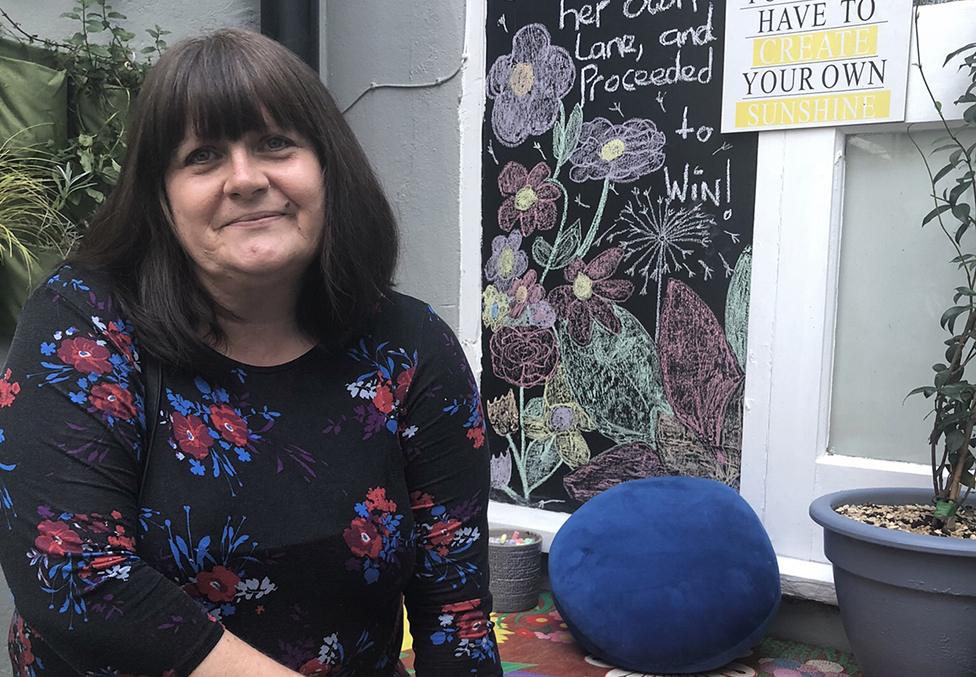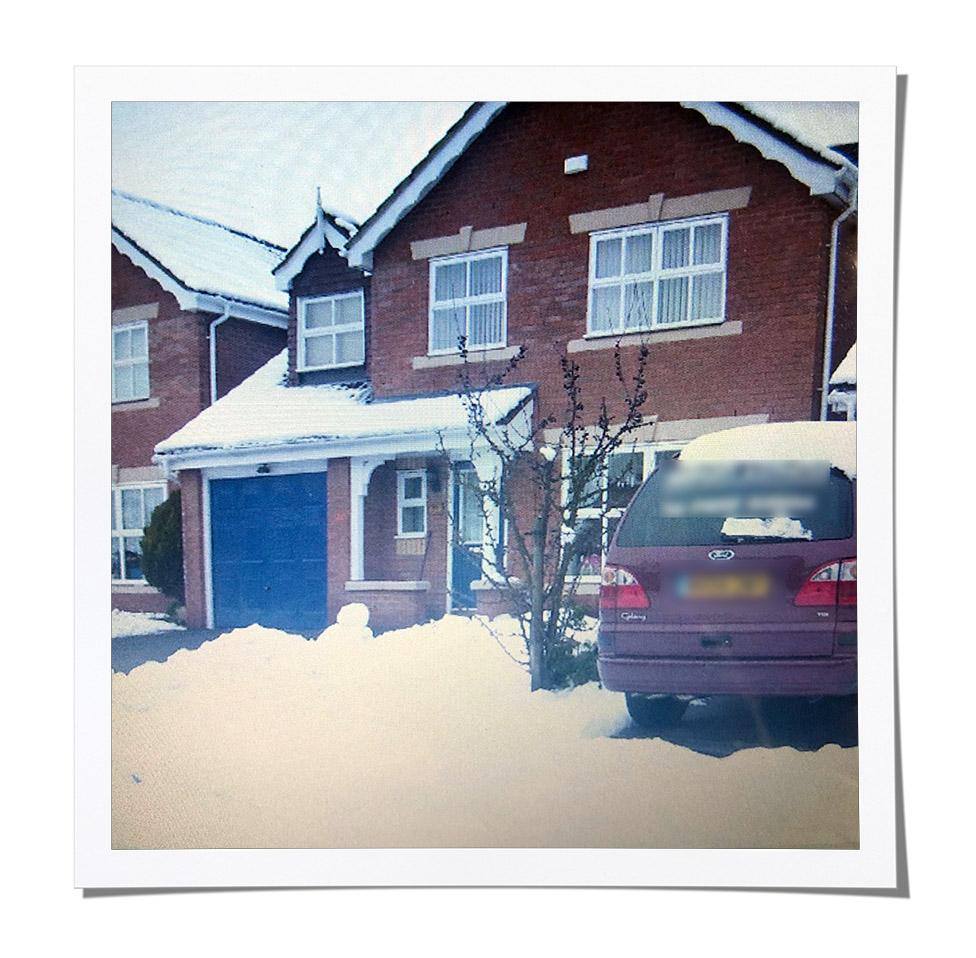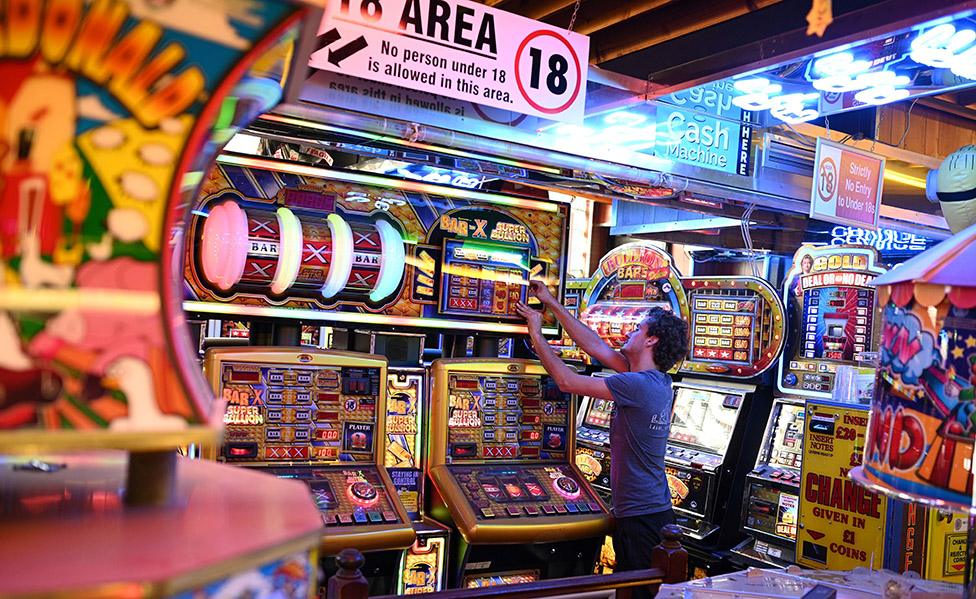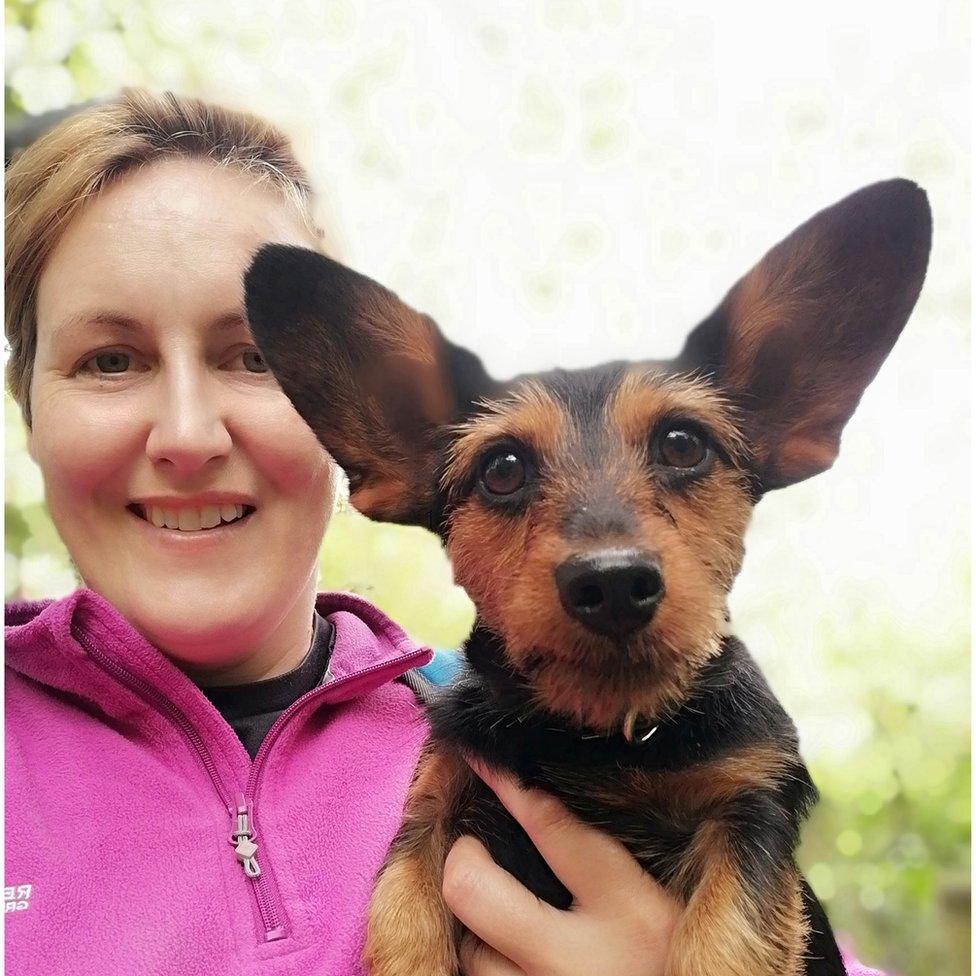‘I gambled our house away without telling my partner’
- Published

New rules have been introduced to make gambling on online slot machines safer. The BBC's Melanie Abbott tells the story of one woman who found out how dangerous they can be.
Five years ago, Michelle Singlehurst decided not to tell her partner their house sale had gone through - she had her own ideas about how to spend the money.
It was the culmination of months of lies to cover up what had become a devastating gambling addiction.
It had started innocuously with playing the lottery online, because it was easier than filling out a slip, then a few flutters on scratch cards. Michelle, aged 53, had always found games calming - she had consoles including a Nintendo Wii and a GameCube when she was younger. "If I felt a little bit overwhelmed when I was trying to do a piece of work, I would go off and play Super Mario or my GameCube," she says. "I think it was a way of escaping from reality."
When she discovered betting games online she was easily hooked.
At the time she was under a lot of stress, as she says her mother was being neglected in her care home.
"She nearly died from dehydration," says Michelle. "I stepped in and got her to hospital. Luckily she got better, but it was touch-and-go."
Like the computer games had been, gambling became an escape. She was particularly attracted to bingo games, which offered bonuses.
Before Michelle knew it, she was gambling in every spare moment between working and looking after her elderly mother and young daughter. She sleeps alone because she wakes up at the slightest noise, so a lot of the gambling happened at night - she would stay up until two or three in the morning.
At the beginning she got excited when she won, but she quickly started to feel quite numb. "I would say it almost became like a sleeping pill," says Michelle. "In the morning I would wake up and I wouldn't have the foggiest idea whether I had still got money in my account or it had all gone. It was quite horrible because you have to log back in to see." Then, having logged in, she would just automatically carry on.
Michelle Singlehurst spoke to Woman's Hour on BBC Radio 4
Michelle opened accounts with nine different companies. Many of them gave her VIP status, which comes with special perks and free gifts. She was invited to sports events and given vouchers to spend on shopping, as well as gambling. "A message would pop up on your account offering more money to gamble with. Looking back, I just feel like I had my eyes shut."
Michelle worked as an independent financial adviser, earning up to £25,000 a year. She sees the irony in that now.
When she had gambled all she had in the bank, she took out a loan without telling her partner, Chris, and borrowed tens of thousands from friends, saying it was for tax bills.
Then she and Chris, a lorry driver, decided to sell the family home in Ash Vale, Surrey.
They were renting a larger house with a granny annexe for Michelle's mother, whom Michelle had taken out of the care home. Initially they rented out their old home, but then decided to move permanently.

Chris, who says he "isn't technically minded", trusted Michelle to look after all the finances and their bank accounts, and she also dealt with the solicitor and estate agent. In 2016 the house sold for £440,000 - and it was when the sale completed that she made the fateful decision to say nothing about it.
"We found a buyer very quickly, but I kept lying about it and making excuses," says Michelle. "And of course he trusted me - we've been together 30 years."
Then, over the next five months, she gambled away every penny - most of it on online slots.
Her mother died during that time and Michelle says that for that reason, or perhaps because of her addiction, her mind was in a fog.
"I can't even remember my thought processes now," she says. "I do remember feeling very panicky, and ashamed about lying. I think these online products mess with your brain really badly. They are designed to suck you in."

Unlike physical slot machines, with online slots it’s possible to stake a lot of money on a single spin
Chris only found out the house had been sold when a friend told him she had spotted new people living in it. Then Michelle had to confess.
"I started shouting. I felt betrayed and then really livid," says Chris. "I asked what made her do it? I didn't even know that you could gamble online. I've never used a computer in my life, so I had no idea it was so easy to lose money like that very quickly."
Chris was so angry he left, taking their nine-year-old daughter with him.
"He said, 'I'm not coming back,'" remembers Michelle. "And then I just fell apart. I began drinking heavily. It was a breakdown."
Unbelievably now, even from my hospital bed I managed to gamble
After spending a dismal Christmas apart from her family, she hit rock bottom, and in January 2017 she took an overdose. She was taken to hospital very ill with hepatitis - her liver had been damaged both by her drinking and by the pills.
"Unbelievably now, even from my hospital bed I managed to gamble," says Michelle.
"It wasn't until I was told I had a one-in-three chance of survival that I finally had a rude awakening. I couldn't believe how ill I was and how close to being homeless.
"In some ways, going to hospital was actually a godsend. Slowly all my feelings came back. I think I'd become very numb."
She spent three weeks there. During that time Chris brought their daughter to visit, and slowly began to forgive her. Soon after she came out of hospital he moved back home.
"We had our daughter too and I thought we should keep ourselves together," says Chris. "I didn't want to split the family up just for the sake of a house. I still loved Michelle. It took a while to get over it, but now I have forgiven her. It's done and dusted."
Kerri Nicholls lost more than £100,000 due to gambling online
But it will have an impact on their future together. Michelle has had to give up her job as a financial adviser, and she and Chris won't be able to get another mortgage, she says.
"We've got absolutely no chance of ever owning a property again. Unless I get some magical job or somehow save up the money, we'll be renting for the rest of our lives."
When Michelle gathered all the data, she found she had lost just short of £550,000 in less than three years.
She has now stopped gambling but says she's not the person she was. "It's about the turmoil and the way it changed you more than the money - even the house. It's about the harm to oneself and others. I recovered from a gambling disorder, yes, but not from the chaos left behind."
While she was gambling the proceeds of the house sale away, Michelle says only one of the nine companies she had signed up with offered her self-exclusion - which involves reporting yourself as a problem gambler, after which your account must be closed and any money in it returned.
But she thinks that, when you are in the grip of a gambling addiction, self-policing may not work anyway. "The problem is a lot of the time you feel partially shut down, so you can't think straight."

Online gambling - the risks
People in the UK have been spending more time gambling online since lockdown, according to the Gambling Commission , external
The average spend per player has increased, particularly for slots, an online version of fruit machines - these can start at £1 per spin but have no upper limit
The Gambling Commission says slot games have by far the highest average losses per player
A House of Lords report called Gambling Harm - Time for Action, external said 60% of the profits for the gambling industry come from the 5% of people who are already problem gamblers, or are at risk of becoming so

The government is currently reviewing gambling laws. New restrictions have just been announced to make casino games safer, including an obligation on operators to clearly display the player's total losses or wins during any online slots session.
The time taken for the slots to spin must also be at least 2.5 seconds, and sounds or imagery giving the illusion of a win when the player has actually lost are now banned.
At the same time, the Gambling Commission has banned "reverse withdrawals" which allowed players to change their mind and gamble with money they had previously decided to save.
Labour MP Carolyn Harris, who co-leads the all-party Parliamentary group on gambling-related harm, says the new measures are a step in the right direction - but more needs to be done.
"The Gambling Commission must immediately look at stakes, or the amount you can wager, as there are no restrictions here and people are getting into very serious difficulties, particularly on online slot games which are highly addictive. We have recommended that a sensible limit would be £2, which is the same as land-based venues," she says.
Brigid Simmons, chairwoman of the Betting and Gambling Council which represents the industry, told the BBC: "We have already implemented a number of policies, from restrictions on advertising to a ban on credit cards. Every single company will be sending out, to their customers, safer gambling tools. Thirty million people gamble in this country and the vast majority of them do it safely and it is something that they enjoy doing."
Although the industry introduced a voluntary ban on TV and radio ads - though not online ads - in the first nationwide lockdown, that ban is no longer in force.
MPs called in June for all advertising to be banned, after hearing from women that daytime ads focusing on fun and friendship appeared to be aimed directly at them.
Michelle would also like to see advertising banned, or at least not allowed before 10pm. "Adverts have absolutely saturated TV," she says. "It's awful that you cannot escape it."
Listen to a discussion about women and gambling on Radio 4's Woman's Hour
Where to get help
GamCare operates the National Gambling Helpline, external, providing information, advice and support for anyone affected by gambling problems - advisers are available 24 hours a day on Freephone 0808 8020 133 or via web chat
Gordon Moody Association, external provides advice, education and therapeutic support to problem gamblers, as well as an intensive residential treatment programme - for more information visit the website or call 01384 241292
Gamstop, external is a free service that lets you put controls in place to help restrict your gambling
Further sources of support can be found on the BBC Action Line
You may also be interested in:

At its worst, Kelly's gambling addiction cost her £500 a day. In recovery now, she fears that online ads could be enough to cause people like her to relapse.